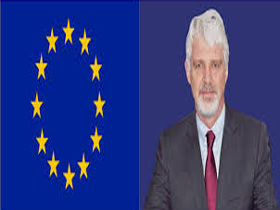Head of Delegation of European Union (EU) to Bangladesh Ambassador William Hanna has visited Sylhet division to see the progress of a number of EU-funded projects in the region.
The three-day visit, from March 17, covered an array of projects ranging from capacity building of tea plantation workers to soil fertility to technical and vocational education and training for young people in the informal sector in the country.
After rounding off the three-day visit on Wednesday, Hanna said: “It was heartening to see how funds from Europe have helped make changes in the lives of many people in every corner in this country. Bangladesh has come a long way since independence, and the EU has always been a steady partner of Bangladesh in this long journey.”
The varied projects in the region show the extent of the European Union’s engagement in the development sector in Bangladesh, according to a media release issued on Wednesday.
For the European Union, democracy and human rights are universal values that should be vigorously promoted around the world, it said.
On March 17, Ambassador Hanna visited the project named ‘Mapping and Capacity Building of Tea Plantation Workers and Little Known Ethnic Communities of Bangladesh’. The European Union is providing about 240,000 euros to improve the living and working conditions of the members of this little known, deprived community.
On the second day of the visit, Ambassador Hanna went to the implementation area of the ‘Soil Fertility Component Project’ funded by the European Union.
The project, with a budget of more than 8 million euros, is being implemented in six ecologically disadvantaged areas of Bangladesh by the Soil Resource Development Institute (SRDI) of the Ministry of Agriculture through local NGOs.
The European Union attaches high importance to skills development of young population in Bangladesh.
On Wednesday, in Sylhet Sadar, Ambassador Hanna visited the project titled ‘Technical and Vocational Education and Training (TVET) for Young People in the Informal Economy in Bangladesh’.
The European Union is providing 1.69 million euros to ensure demand driven and flexible Technical and Vocational Education and Training for young people in the informal sector in the country.
Source: UNBConnect










